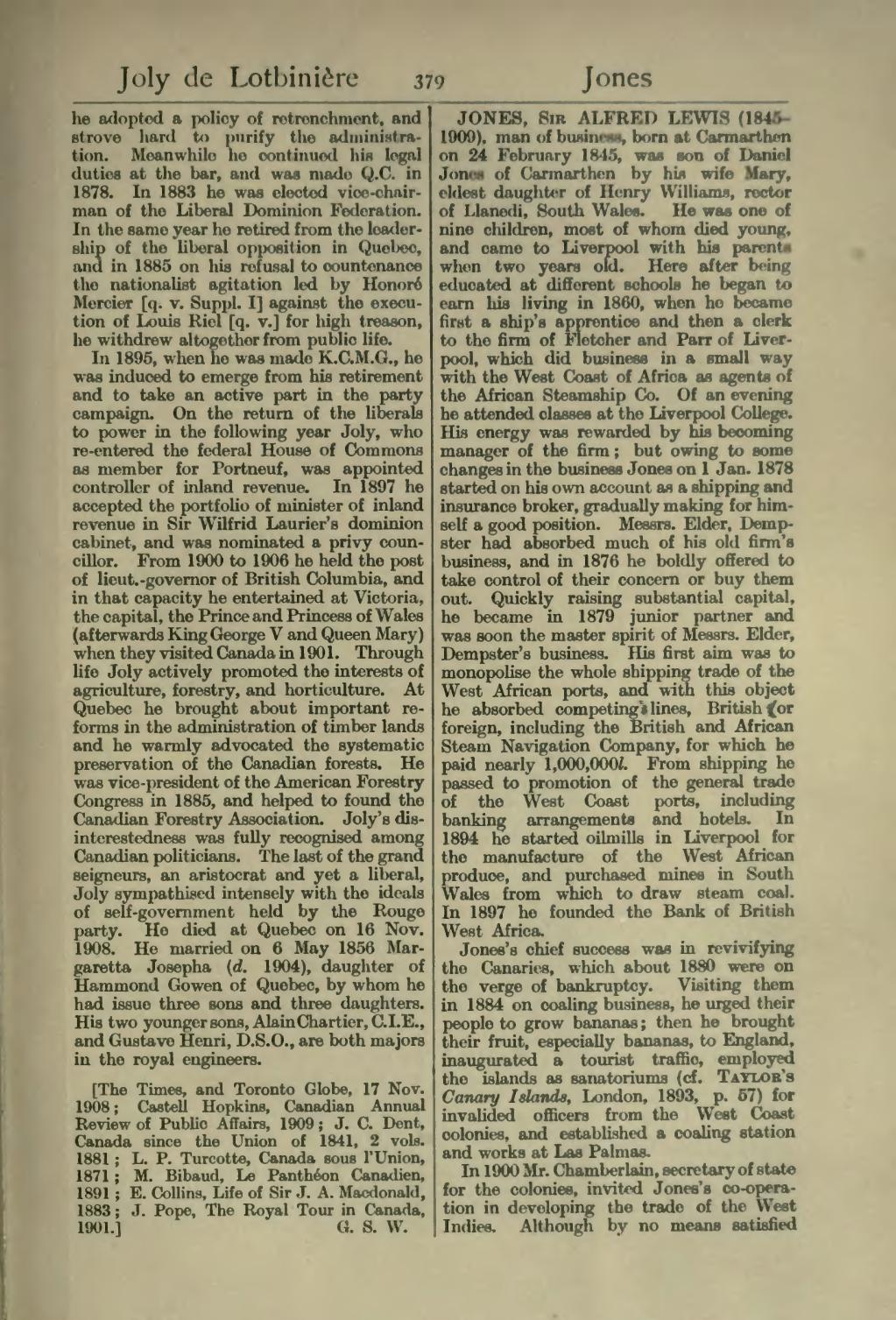he adopted a policy of retrenchment, and strove hard to purify the administration. Meanwhile he continued his legal duties at the bar, and was made Q.C. in 1878. In 1883 he was elected vice-chairman of the Liberal Dominion Federation. In the same year he retired from the leadership of the liberal opposition in Quebec, and in 1885 on his refusal to countenance the nationalist agitation led by Honoré Mercier [q. v. Suppl. I] against the execution of Louis Riel [q. v.] for high treason, he withdrew altogether from public life.
In 1895, when he was made K.C.M.G., he was induced to emerge from his retirement and to take an active part in the party campaign. On the return of the liberals to power in the following year Joly, who re-entered the federal House of Commons as member for Portneuf, was appointed controller of inland revenue. In 1897 he accepted the portfolio of minister of inland revenue in Sir Wilfrid Laurier's dominion cabinet, and was nominated a privy councillor. From 1900 to 1906 he held the post of lieut.-governor of British Columbia, and in that capacity he entertained at Victoria, the capital, the Prince and Princess of Wales (afterwards King George V and Queen Mary) when they visited Canada in 1901. Through life Joly actively promoted the interests of agriculture, forestry, and horticulture. At Quebec he brought about important reforms in the administration of timber lands and he warmly advocated the systematic preservation of the Canadian forests. He was vice-president of the American Forestry Congress in 1885, and helped to found the Canadian Forestry Association. Joly's disinterestedness was fully recognised among Canadian politicians. The last of the grand seigneurs, an aristocrat and yet a liberal, Joly sympathised intensely with the ideals of self-government held by the Rouge party. He died at Quebec on 16 Nov. 1908. He married on 6 May 1856 Margaretta Josepha (d. 1904), daughter of Hammond Gowen of Quebec, by whom he had issue three sons and three daughters. His two younger sons, Alain Chartier, C.I.E., and Gustave Henri, D.S.O., are both majors in the royal engineers.
[The Times, and Toronto Globe, 17 Nov. 1908; Castell Hopkins, Canadian Annual Review of Public Affairs, 1909; J. C. Dent, Canada since the Union of 1841, 2 vols. 1881; L. P. Turcotte, Canada sous l'Union, 1871; M. Bibaud, Le Panthéon Canadien, 1891; E. Collins, Life of Sir J. A. Macdonald, 1883; J. Pope, The Royal Tour in Canada, 1901.]
JONES, Sir ALFRED LEWIS (1845–1900), man of business, born at Carmarthen on 24 February 1845, was son of Daniel Jones of Carmarthen by his wife Mary, eldest daughter of Henry Williams, rector of Llanedi, South Wales. He was one of nine children, most of whom died young, and came to Liverpool with his parents when two years old. Here after being educated at different schools he began to earn his living in 1860, when he became first a ship's apprentice and then a clerk to the firm of Fletcher and Parr of Liverpool, which did business in a small way with the West Coast of Africa as agents of the African Steamship Co. Of an evening he attended classes at the Liverpool College. His energy was rewarded by his becoming manager of the firm; but owing to some changes in the business Jones on 1 Jan. 1878 started on his own account as a shipping and insurance broker, gradually making for himself a good position. Messrs. Elder, Dempster had absorbed much of his old firm's business, and in 1876 he boldly offered to take control of their concern or buy them out. Quickly raising substantial capital, he became in 1879 junior partner and was soon the master spirit of Messrs. Elder, Dempster's business. His first aim was to monopolise the whole shipping trade of the West African ports, and with this object he absorbed competing lines, British for foreign, including the British and African Steam Navigation Company, for which he paid nearly 1,000,000l. From shipping he passed to promotion of the general trade of the West Coast ports, including banking arrangements and hotels. In 1894 he started oilmills in Liverpool for the manufacture of the West African produce, and purchased mines in South Wales from which to draw steam coal. In 1897 he founded the Bank of British West Africa.
Jones's chief success was in revivifying the Canaries, which about 1880 were on the verge of bankruptcy. Visiting them in 1884 on coaling business, he urged their people to grow bananas; then he brought their fruit, especially bananas, to England, inaugurated a tourist traffic, employed the islands as sanatoriums (cf. Taylor's Canary Islands, London, 1893, p. 67) for invalided officers from the West Coast colonies, and established a coaling station and works at Las Palmas.
In 1900 Mr. Chamberlain, secretary of state for the colonies, invited Jones's co-operation in developing the trade of the West Indies. Although by no means satisfied
